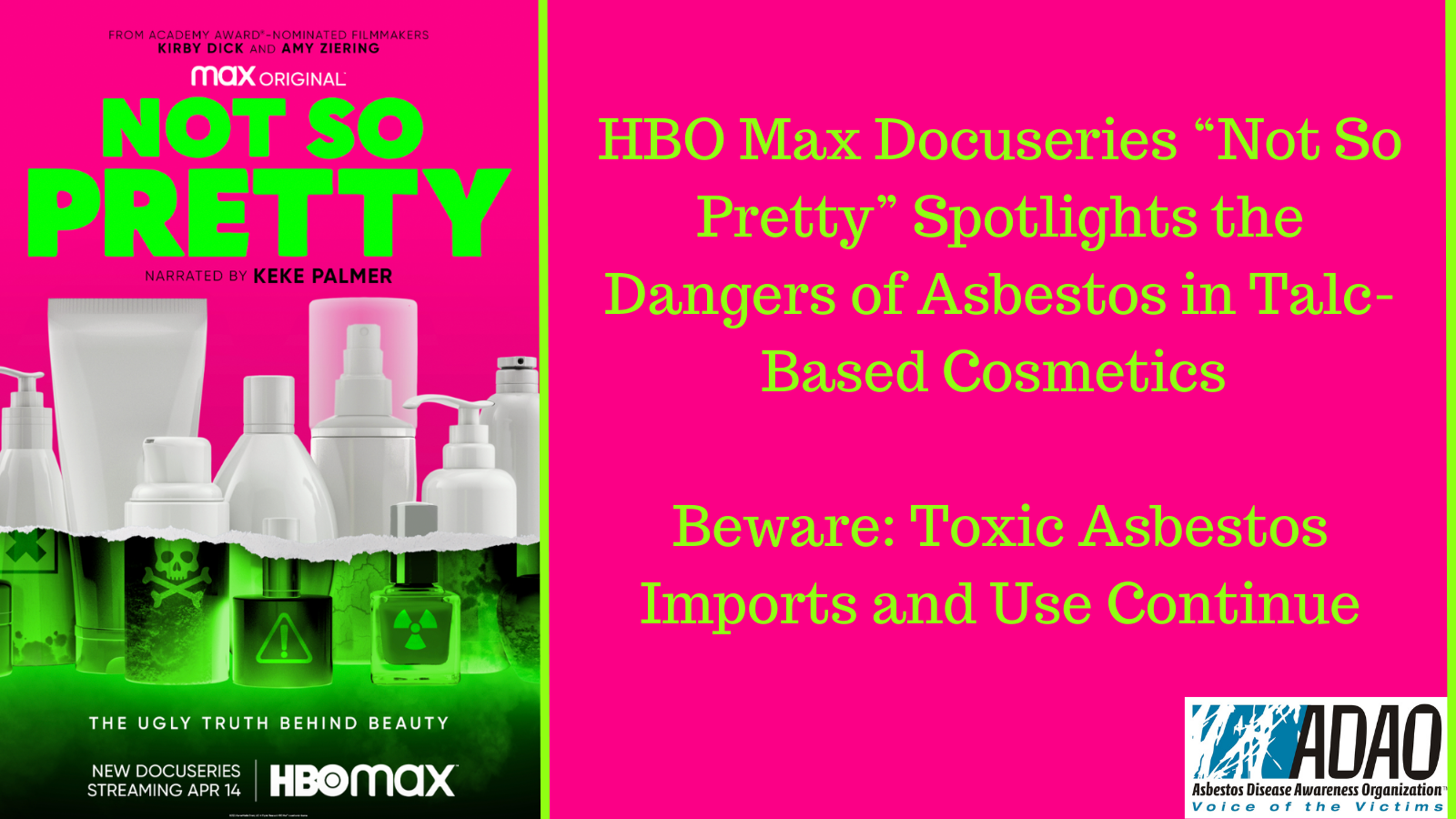Posted on April 26, 2022
A new HBO Max Docuseries shines a light on the dangers of asbestos-contaminated cosmetics products, something that the Asbestos Disease Awareness Organization (ADAO) has been writing about since 2007. The first episode of the 4-part series focuses on make-up and the asbestos found in talcum-based products.
Each year, the U.S. spends $716 billion on cosmetics, according to the documentary series. The show focuses on two victims: Corrin Ortillo, who was diagnosed with mesothelioma after years of using products she claims contained asbestos-contaminated talc, and a 78-year-old former obstetrician-gynecologist, Thomas McHattie, also suffering from mesothelioma. In addition to the two patients, Kristi Warner, mother of Mackenzie, shared her story about testing her daughter’s Claire’s makeup, which tested positive for asbestos. Kristi spoke with ADAO back in 2018, and I distinctly remember hearing the fear in her voice. It was the beginning of a new year when I wrote about her findings in WARNING! Asbestos Found Again in Tween Makeup Products. Four years later, imports and use continue, and the death rate from asbestos-caused illnesses has since risen.
The episode remarks on both Johnson & Johnson’s baby powder product and the makeup kits sold by mall retailer Claire’s — two topics that ADAO has written and discussed extensively. In February 2020, ADAO spoke at a public meeting held by the Environmental Protection Agency (EPA) about asbestos testing and the health risk of exposure. In 2007, ADAO reported findings based on a research study led by Scientific Analytical Institute, Inc., that examined more than 250 suspect products acquired at national commercial retailers within the last 18 months. Samples were drawn from diverse areas, including foods, drugs, toiletries, cosmetics, hardware, cleaning products, and children’s toys.
“Not So Pretty” also addresses the experiments done in 1971 by Johnson & Johnson’s, which involved injecting the asbestos into the lower backs of Pennsylvania inmates. It goes on to discuss accusations J&J specifically marketed their product to Black communities, specifically women, that had less access to medical care. Thousands of women are suing the corporation over cancer concerns due to the usage of J&J’s toxic product.
All of these negativities surrounding asbestos and asbestos use is an alarm bell ADAO= has been trying to ring. In 2020, ADAO publicly urged J&J to stop selling its asbestos-contaminated talc-based baby powder in the global market, even as it faces multiple lawsuits here in the United States. We joined over 200 organizations from 50 countries who called on Johnson & Johnson again to remove the asbestos-contaminated talc-based powder from its shelves. As pointed out by ADAO’s ally, Black Women for Wellness in the letter, the powder has historically been aggressively marketed to women of color, putting Black women at a higher risk of asbestos-caused illness such as ovarian cancer and asbestosis.
ADAO is grateful that “Not So Pretty” is addressing this long-known issue. Asbestos is still legal and lethal in the United States today, and is imported by the hundreds of tons each year. Annually, over 40,000 Americans die from preventable, asbestos-caused diseases. We need to ban asbestos once and for all, and finally, stop this man-made disaster before it takes any more innocent lives.
Thank you to the directors Kirby Dick and Amy Ziering, producers, the camera crew, HBO Max, Corrin and Thomas, and everyone who worked on the docuseries, for shedding light on this incredibly important topic. ADAO is grateful to have this brought to the public arena, as these are issues that we have been trying to raise for years.
From here, we go onward to ban asbestos and empower the Environmental Protection Agency and the Food and Drug Administration to use their regulatory power to protect the public from deadly asbestos.
Linda Reinstein
Social Networks
